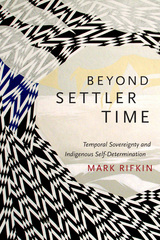4 books by Rifkin, Mark

Beyond Settler Time
Temporal Sovereignty and Indigenous Self-Determination
Mark Rifkin
Duke University Press, 2017
What does it mean to say that Native peoples exist in the present? In Beyond Settler Time Mark Rifkin investigates the dangers of seeking to include Indigenous peoples within settler temporal frameworks. Claims that Native peoples should be recognized as coeval with Euro-Americans, Rifkin argues, implicitly treat dominant non-native ideologies and institutions as the basis for defining time itself. How, though, can Native peoples be understood as dynamic and changing while also not assuming that they belong to a present inherently shared with non-natives? Drawing on physics, phenomenology, queer studies, and postcolonial theory, Rifkin develops the concept of "settler time" to address how Native peoples are both consigned to the past and inserted into the present in ways that normalize non-native histories, geographies, and expectations. Through analysis of various kinds of texts, including government documents, film, fiction, and autobiography, he explores how Native experiences of time exceed and defy such settler impositions. In underscoring the existence of multiple temporalities, Rifkin illustrates how time plays a crucial role in Indigenous peoples’ expressions of sovereignty and struggles for self-determination.
[more]

Fictions of Land and Flesh
Blackness, Indigeneity, Speculation
Mark Rifkin
Duke University Press, 2019
In Fictions of Land and Flesh Mark Rifkin explores the impasses that arise in seeking to connect Black and Indigenous movements, turning to speculative fiction to understand those difficulties and envision productive ways of addressing them. Against efforts to subsume varied forms of resistance into a single framework in the name of solidarity, Rifkin argues that Black and Indigenous political struggles are oriented in distinct ways, following their own lines of development and contestation. Rifkin suggests how movement between the two can be approached as something of a speculative leap in which the terms and dynamics of one are disoriented in the encounter with the other. Futurist fiction provides a compelling site for exploring such disjunctions. Through analyses of works by Octavia Butler, Walter Mosley, Nalo Hopkinson, Melissa Tantaquidgeon Zobel, and others, the book illustrates how ideas about fungibility, fugitivity, carcerality, marronage, sovereignty, placemaking, and governance shape the ways Black and Indigenous intellectuals narrate the past, present, and future. In turning to speculative fiction, Rifkin illustrates how speculation as a process provides conceptual and ethical resources for recognizing difference while engaging across it.
[more]

The Politics of Kinship
Race, Family, Governance
Mark Rifkin
Duke University Press, 2024
What if we understood the idea of family as central to representing alternative forms of governance as expressions of racial deviance? In The Politics of Kinship, Mark Rifkin shows how ideologies of family, including notions of kinship, recast Indigenous and other forms of collective self-organization and self-determination as disruptive racial tendencies in need of state containment and intervention. Centering work in Indigenous studies, Rifkin illustrates how conceptions of family and race work together as part of ongoing efforts to regulate, assault, and efface other political orders. The book examines the history of anthropology and its resonances in contemporary queer scholarship, contemporary Indian policy from the 1970s onward, the legal history of family formation and privacy in the United States, and the association of blackness with criminality across US history. In this way, Rifkin seeks to open new possibilities for envisioning what kinds of relations, networks, and formations can and should be seen as governance on lands claimed by the United States.
[more]

Speaking for the People
Native Writing and the Question of Political Form
Mark Rifkin
Duke University Press, 2021
In Speaking for the People Mark Rifkin examines nineteenth-century Native writings to reframe contemporary debates around Indigenous recognition, refusal, and resurgence. Rifkin shows how works by Native authors (William Apess, Elias Boudinot, Sarah Winnemucca, and Zitkala-Ša) illustrate the intellectual labor involved in representing modes of Indigenous political identity and placemaking. These writers highlight the complex processes involved in negotiating the character, contours, and scope of Indigenous sovereignties under ongoing colonial occupation. Rifkin argues that attending to these writers' engagements with non-native publics helps provide further analytical tools for addressing the complexities of Indigenous governance on the ground—both then and now. Thinking about Native peoplehood and politics as a matter of form opens possibilities for addressing the difficult work involved in navigating among varied possibilities for conceptualizing and enacting peoplehood in the context of continuing settler intervention. As Rifkin demonstrates, attending to writings by these Indigenous intellectuals provides ways of understanding Native governance as a matter of deliberation, discussion, and debate, emphasizing the open-ended unfinishedness of self-determination.
[more]
READERS
Browse our collection.
PUBLISHERS
See BiblioVault's publisher services.
STUDENT SERVICES
Files for college accessibility offices.
UChicago Accessibility Resources
home | accessibility | search | about | contact us
BiblioVault ® 2001 - 2024
The University of Chicago Press









